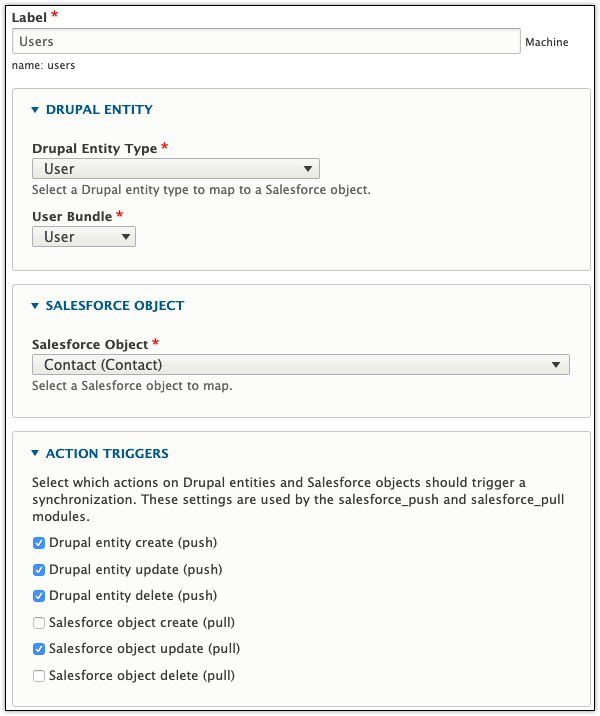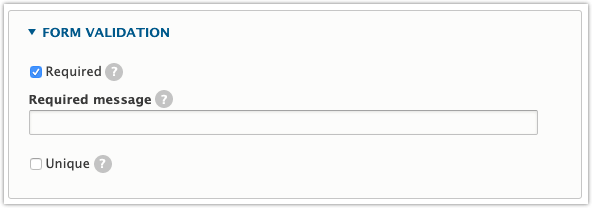-
Conditionally Triggering Salesforce Push Operations in Drupal 8
The user interface for the Salesforce Suite in Drupal 8 is fantastic. The suite itself is incredibly powerful. Among the many options, for each mapping you create you can specify what operations should trigger a synchronization. Here’s an example:

We recently faced an issue with the “Drupal entity update” trigger being called too often. The salesforce_push module implements hook_entity_update() , which gets called a lot. After looking at how the functions are called in salesforce_push.module I realized there were two choices:
-
Patch for Drupal 8.7.14 SA-CORE-2020-004, SA-CORE-2020-005, and SA-CORE-2020-006
I have a site that’s temporarily stuck on 8.7.14; it’s not worth the risk to update to 8.8.8 right now.
I was able to diff 8.8.7 and 8.8.8 to figure out what changes were made for these security announcements:
- Drupal core – Critical – Cross-Site Request Forgery – SA-CORE-2020-004
- Drupal core – Critical – Arbitrary PHP code execution – SA-CORE-2020-005
- Drupal core – Less critical – Access bypass – SA-CORE-2020-006
I could then compare the changes with 8.7.14 to create the patch below, which applies against 8.7.14 without any issues.
DISCLAIMER: The formal recommendation is to update to 8.8.8 if at all possible. Use the patch below at your own risk.
123456789101112131415161718192021222324252627282930313233343536373839404142434445464748495051525354555657585960616263646566676869707172737475767778798081828384858687888990919293949596979899100101102103104105106107108109110111112113114115116117118119120121122123124125126127128129130131132133134135136137138139140141142143144145146147148149150151152153154155156157158159160161162163164165166167168169170171172173174175176177178179180181182183184185186187188189190191192193194195196197198199200201202203204205206207208209210211212213214215216217218219220221222223224225226227228229230231232233234235236237238239240241242243244245246247248249250251252253254255256257258259260261262263264265266267268269270271272273274275276277278279280281282283284285286287288289290diff --git a/core/includes/bootstrap.inc b/core/includes/bootstrap.incindex 348724d6..e9b7cbc1 100644--- a/core/includes/bootstrap.inc+++ b/core/includes/bootstrap.inc@@ -673,11 +673,17 @@ function drupal_valid_test_ua($new_prefix = NULL) {// Ensure that no information leaks on production sites.$test_db = new TestDatabase($prefix);$key_file = DRUPAL_ROOT . '/' . $test_db->getTestSitePath() . '/.htkey';- if (!is_readable($key_file)) {+ if (!is_readable($key_file) || is_dir($key_file)) {header($_SERVER['SERVER_PROTOCOL'] . ' 403 Forbidden');exit;}$private_key = file_get_contents($key_file);+ // The string from drupal_generate_test_ua() is 74 bytes long. If we don't+ // have it, tests cannot be allowed.+ if (empty($private_key) || strlen($private_key) < 74) {+ header($_SERVER['SERVER_PROTOCOL'] . ' 403 Forbidden');+ exit;+ }// The file properties add more entropy not easily accessible to others.$key = $private_key . filectime(__FILE__) . fileinode(__FILE__);$time_diff = REQUEST_TIME - $time;diff --git a/core/lib/Drupal/Core/Form/FormBuilder.php b/core/lib/Drupal/Core/Form/FormBuilder.phpindex 4bf64196..7bacc473 100644--- a/core/lib/Drupal/Core/Form/FormBuilder.php+++ b/core/lib/Drupal/Core/Form/FormBuilder.php@@ -18,6 +18,7 @@use Drupal\Core\Theme\ThemeManagerInterface;use Symfony\Component\EventDispatcher\EventDispatcherInterface;use Symfony\Component\HttpFoundation\FileBag;+use Symfony\Component\HttpFoundation\ParameterBag;use Symfony\Component\HttpFoundation\RequestStack;use Symfony\Component\HttpFoundation\Response;@@ -955,8 +956,16 @@ public function doBuildForm($form_id, &$element, FormStateInterface &$form_state// This value is checked in self::handleInputElement().$form_state->setInvalidToken(TRUE);+ // Ignore all submitted values.+ $form_state->setUserInput([]);++ $request = $this->requestStack->getCurrentRequest();+ // Do not trust any POST data.+ $request->request = new ParameterBag();// Make sure file uploads do not get processed.- $this->requestStack->getCurrentRequest()->files = new FileBag();+ $request->files = new FileBag();+ // Ensure PHP globals reflect these changes.+ $request->overrideGlobals();}}}diff --git a/core/lib/Drupal/Core/Form/FormValidator.php b/core/lib/Drupal/Core/Form/FormValidator.phpindex 57d24cc2..2afcb52b 100644--- a/core/lib/Drupal/Core/Form/FormValidator.php+++ b/core/lib/Drupal/Core/Form/FormValidator.php@@ -124,10 +124,8 @@ public function validateForm($form_id, &$form, FormStateInterface &$form_state)* {@inheritdoc}*/public function setInvalidTokenError(FormStateInterface $form_state) {- $url = $this->requestStack->getCurrentRequest()->getRequestUri();-// Setting this error will cause the form to fail validation.- $form_state->setErrorByName('form_token', $this->t('The form has become outdated. Copy any unsaved work in the form below and then <a href=":link">reload this page</a>.', [':link' => $url]));+ $form_state->setErrorByName('form_token', $this->t('The form has become outdated. Press the back button, copy any unsaved work in the form, and then reload the page.'));}/**diff --git a/core/modules/file/tests/src/Functional/FileManagedFileElementTest.php b/core/modules/file/tests/src/Functional/FileManagedFileElementTest.phpindex 0b6254d8..db8e7fbe 100644--- a/core/modules/file/tests/src/Functional/FileManagedFileElementTest.php+++ b/core/modules/file/tests/src/Functional/FileManagedFileElementTest.php@@ -45,7 +45,7 @@ public function testManagedFile() {$file_field_name => \Drupal::service('file_system')->realpath($test_file->getFileUri()),];$this->drupalPostForm(NULL, $edit, t('Save'));- $this->assertText('The form has become outdated. Copy any unsaved work in the form below');+ $this->assertText('The form has become outdated.');$last_fid = $this->getLastFileId();$this->assertEqual($last_fid_prior, $last_fid, 'File was not saved when uploaded with an invalid form token.');diff --git a/core/modules/jsonapi/src/Controller/EntityResource.php b/core/modules/jsonapi/src/Controller/EntityResource.phpindex 5c43d3ee..e21903c2 100644--- a/core/modules/jsonapi/src/Controller/EntityResource.php+++ b/core/modules/jsonapi/src/Controller/EntityResource.php@@ -315,7 +315,7 @@ public function patchIndividual(ResourceType $resource_type, EntityInterface $en));}$data += ['attributes' => [], 'relationships' => []];- $field_names = array_merge(array_keys($data['attributes']), array_keys($data['relationships']));+ $field_names = array_map([$resource_type, 'getInternalName'], array_merge(array_keys($data['attributes']), array_keys($data['relationships'])));array_reduce($field_names, function (EntityInterface $destination, $field_name) use ($resource_type, $parsed_entity) {$this->updateEntityField($resource_type, $parsed_entity, $destination, $field_name);diff --git a/core/modules/jsonapi/src/Controller/FileUpload.php b/core/modules/jsonapi/src/Controller/FileUpload.phpindex b07dd51d..f8517fd7 100644--- a/core/modules/jsonapi/src/Controller/FileUpload.php+++ b/core/modules/jsonapi/src/Controller/FileUpload.php@@ -112,6 +112,7 @@ public function __construct(AccountInterface $current_user, EntityFieldManagerIn* created file entity.*/public function handleFileUploadForExistingResource(Request $request, ResourceType $resource_type, $file_field_name, FieldableEntityInterface $entity) {+ $file_field_name = $resource_type->getInternalName($file_field_name);$field_definition = $this->validateAndLoadFieldDefinition($resource_type->getEntityTypeId(), $resource_type->getBundle(), $file_field_name);static::ensureFileUploadAccess($this->currentUser, $field_definition, $entity);@@ -138,7 +139,7 @@ public function handleFileUploadForExistingResource(Request $request, ResourceTy$entity->save();$route_parameters = ['entity' => $entity->uuid()];- $route_name = sprintf('jsonapi.%s.%s.related', $resource_type->getTypeName(), $file_field_name);+ $route_name = sprintf('jsonapi.%s.%s.related', $resource_type->getTypeName(), $resource_type->getPublicName($file_field_name));$related_url = Url::fromRoute($route_name, $route_parameters)->toString(TRUE);$request = Request::create($related_url->getGeneratedUrl(), 'GET', [], $request->cookies->all(), [], $request->server->all());return $this->httpKernel->handle($request, HttpKernelInterface::SUB_REQUEST);@@ -161,6 +162,7 @@ public function handleFileUploadForExistingResource(Request $request, ResourceTy* Thrown when there are validation errors.*/public function handleFileUploadForNewResource(Request $request, ResourceType $resource_type, $file_field_name) {+ $file_field_name = $resource_type->getInternalName($file_field_name);$field_definition = $this->validateAndLoadFieldDefinition($resource_type->getEntityTypeId(), $resource_type->getBundle(), $file_field_name);static::ensureFileUploadAccess($this->currentUser, $field_definition);@@ -182,7 +184,7 @@ public function handleFileUploadForNewResource(Request $request, ResourceType $r/* $self_link = new Link(new CacheableMetadata(), $this->entity->toUrl('jsonapi'), ['self']); */$links = new LinkCollection(['self' => $self_link]);- $relatable_resource_types = $resource_type->getRelatableResourceTypesByField($file_field_name);+ $relatable_resource_types = $resource_type->getRelatableResourceTypesByField($resource_type->getPublicName($file_field_name));$file_resource_type = reset($relatable_resource_types);$resource_object = ResourceObject::createFromEntity($file_resource_type, $file);return new ResourceResponse(new JsonApiDocumentTopLevel(new ResourceObjectData([$resource_object], 1), new NullIncludedData(), $links), 201, []);diff --git a/core/modules/system/tests/src/Functional/Form/FormTest.php b/core/modules/system/tests/src/Functional/Form/FormTest.phpindex 849944b0..62ae3c54 100644--- a/core/modules/system/tests/src/Functional/Form/FormTest.php+++ b/core/modules/system/tests/src/Functional/Form/FormTest.php@@ -244,21 +244,27 @@ public function testInputWithInvalidToken() {$this->assertSession()->elementExists('css', 'input[name="form_token"]')->setValue('invalid token');+ $random_string = $this->randomString();$edit = [- 'textfield' => $this->randomString(),+ 'textfield' => $random_string,'checkboxes[bar]' => TRUE,'select' => 'bar','radios' => 'foo',];$this->drupalPostForm(NULL, $edit, 'Submit');$this->assertFieldByXpath('//div[contains(@class, "error")]', NULL, 'Error message is displayed with invalid token even when required fields are filled.');- $this->assertText('The form has become outdated. Copy any unsaved work in the form below');- // Verify that input elements retained the posted values.- $this->assertFieldByName('textfield', $edit['textfield']);++ $assert = $this->assertSession();+ $element = $assert->fieldExists('textfield');+ $this->assertEmpty($element->getValue());+ $assert->responseNotContains($random_string);+ $this->assertText('The form has become outdated.');+ // Ensure that we don't use the posted values.+ $this->assertFieldByName('textfield', '');$this->assertNoFieldChecked('edit-checkboxes-foo');- $this->assertFieldChecked('edit-checkboxes-bar');- $this->assertOptionSelected('edit-select', 'bar');- $this->assertFieldChecked('edit-radios-foo');+ $this->assertNoFieldChecked('edit-checkboxes-bar');+ $this->assertOptionSelected('edit-select', '');+ $this->assertNoFieldChecked('edit-radios-foo');// Check another form that has a textarea input.$this->drupalGet(Url::fromRoute('form_test.required'));@@ -271,9 +277,9 @@ public function testInputWithInvalidToken() {];$this->drupalPostForm(NULL, $edit, 'Submit');$this->assertFieldByXpath('//div[contains(@class, "error")]', NULL, 'Error message is displayed with invalid token even when required fields are filled.');- $this->assertText('The form has become outdated. Copy any unsaved work in the form below');- $this->assertFieldByName('textfield', $edit['textfield']);- $this->assertFieldByName('textarea', $edit['textarea']);+ $this->assertText('The form has become outdated.');+ $this->assertFieldByName('textfield', '');+ $this->assertFieldByName('textarea', '');// Check another form that has a number input.$this->drupalGet(Url::fromRoute('form_test.number'));@@ -281,12 +287,14 @@ public function testInputWithInvalidToken() {->elementExists('css', 'input[name="form_token"]')->setValue('invalid token');$edit = [- 'integer_step' => mt_rand(1, 100),+ // We choose a random value which is higher than the default value,+ // so we don't accidentally generate the default value.+ 'integer_step' => mt_rand(6, 100),];$this->drupalPostForm(NULL, $edit, 'Submit');$this->assertFieldByXpath('//div[contains(@class, "error")]', NULL, 'Error message is displayed with invalid token even when required fields are filled.');- $this->assertText('The form has become outdated. Copy any unsaved work in the form below');- $this->assertFieldByName('integer_step', $edit['integer_step']);+ $this->assertText('The form has become outdated.');+ $this->assertFieldByName('integer_step', 5);// Check a form with a Url field$this->drupalGet(Url::fromRoute('form_test.url'));@@ -298,8 +306,9 @@ public function testInputWithInvalidToken() {];$this->drupalPostForm(NULL, $edit, 'Submit');$this->assertFieldByXpath('//div[contains(@class, "error")]', NULL, 'Error message is displayed with invalid token even when required fields are filled.');- $this->assertText('The form has become outdated. Copy any unsaved work in the form below');- $this->assertFieldByName('url', $edit['url']);+ $this->assertText('The form has become outdated.');+ $this->assertFieldByName('url', '');+}/**diff --git a/core/modules/system/tests/src/Functional/Form/ValidationTest.php b/core/modules/system/tests/src/Functional/Form/ValidationTest.phpindex 094a0af7..50451a98 100644--- a/core/modules/system/tests/src/Functional/Form/ValidationTest.php+++ b/core/modules/system/tests/src/Functional/Form/ValidationTest.php@@ -68,7 +68,7 @@ public function testValidate() {$this->drupalPostForm(NULL, ['name' => 'validate'], 'Save');$this->assertNoFieldByName('name', '#value changed by #validate', 'Form element #value was not altered.');$this->assertNoText('Name value: value changed by setValueForElement() in #validate', 'Form element value in $form_state was not altered.');- $this->assertText('The form has become outdated. Copy any unsaved work in the form below');+ $this->assertText('The form has become outdated.');}/**diff --git a/core/tests/Drupal/Tests/Core/Form/FormBuilderTest.php b/core/tests/Drupal/Tests/Core/Form/FormBuilderTest.phpindex 8d20db5c..d2dec0c6 100644--- a/core/tests/Drupal/Tests/Core/Form/FormBuilderTest.php+++ b/core/tests/Drupal/Tests/Core/Form/FormBuilderTest.php@@ -799,12 +799,30 @@ public function testInvalidToken($expected, $valid_token, $user_is_authenticated$expected_form = $form_id();$form_arg = $this->getMockForm($form_id, $expected_form);+ // Set up some request data so we can be sure it is removed when a token is+ // invalid.+ $this->request->request->set('foo', 'bar');+ $_POST['foo'] = 'bar';+$form_state = new FormState();$input['form_id'] = $form_id;$input['form_token'] = $form_token;+ $input['test'] = 'example-value';$form_state->setUserInput($input);- $this->simulateFormSubmission($form_id, $form_arg, $form_state, FALSE);+ $form = $this->simulateFormSubmission($form_id, $form_arg, $form_state, FALSE);$this->assertSame($expected, $form_state->hasInvalidToken());+ if ($expected) {+ $this->assertEmpty($form['test']['#value']);+ $this->assertEmpty($form_state->getValue('test'));+ $this->assertEmpty($_POST);+ $this->assertEmpty(iterator_to_array($this->request->request->getIterator()));+ }+ else {+ $this->assertEquals('example-value', $form['test']['#value']);+ $this->assertEquals('example-value', $form_state->getValue('test'));+ $this->assertEquals('bar', $_POST['foo']);+ $this->assertEquals('bar', $this->request->request->get('foo'));+ }}public function providerTestInvalidToken() {diff --git a/core/tests/Drupal/Tests/Core/Form/FormTestBase.php b/core/tests/Drupal/Tests/Core/Form/FormTestBase.phpindex ef08ab77..36605065 100644--- a/core/tests/Drupal/Tests/Core/Form/FormTestBase.php+++ b/core/tests/Drupal/Tests/Core/Form/FormTestBase.php@@ -173,7 +173,7 @@ protected function setUp() {->getMock();$this->account = $this->getMock('Drupal\Core\Session\AccountInterface');$this->themeManager = $this->getMock('Drupal\Core\Theme\ThemeManagerInterface');- $this->request = new Request();+ $this->request = Request::createFromGlobals();$this->eventDispatcher = $this->getMock('Symfony\Component\EventDispatcher\EventDispatcherInterface');$this->requestStack = new RequestStack();$this->requestStack->push($this->request);diff --git a/core/tests/Drupal/Tests/Core/Form/FormValidatorTest.php b/core/tests/Drupal/Tests/Core/Form/FormValidatorTest.phpindex 18f0be28..10f54905 100644--- a/core/tests/Drupal/Tests/Core/Form/FormValidatorTest.php+++ b/core/tests/Drupal/Tests/Core/Form/FormValidatorTest.php@@ -131,7 +131,7 @@ public function testValidateInvalidFormToken() {->getMock();$form_state->expects($this->once())->method('setErrorByName')- ->with('form_token', 'The form has become outdated. Copy any unsaved work in the form below and then <a href="/test/example?foo=bar">reload this page</a>.');+ ->with('form_token', 'The form has become outdated. Press the back button, copy any unsaved work in the form, and then reload the page.');$form_state->setValue('form_token', 'some_random_token');$form_validator->validateForm('test_form_id', $form, $form_state);$this->assertTrue($form_state->isValidationComplete()); -
Storing First and Last Name with Social API for Drupal 8
I recently worked on a project that relied on Social API for Google, Facebook, and Yahoo authentication. Out of the box everything worked great. Our site stores the user’s first name and last name in two fields on the user entity: field_first_name and field_last_name. There are a few ways to tap into the Social API authentication process (which comes from the Social Auth component).
Originally we leveraged the SocialAuthEvents::USER_CREATED event in an event subscriber. We set the first name and last name, then re-saved the user. This, however, executes after the user is created. The issue we had was that we also have Salesforce integration and both name fields are required in Salesforce. When the user is first saved it was pushing to Salesforce without the name fields, which triggered an error.
The solution was to implement a different event handler: SocialAuthEvents::USER_FIELDS
This lets you manipulate the user fields before the user is saved. I poked through the Social Auth code and figured out how to get the first and last name values. Here’s the working solution:
web/modules/custom/mymodule/mymodule.services.yml
12345services:mymodule.social_auth_subscriber:class: Drupal\mymodule\EventSubscriber\MymoduleSocialAuthSubscribertags:- { name: 'event_subscriber' }web/modules/custom/mymodule/src/EventSubscriber/MymoduleSocialAuthSubscriber.php
12345678910111213141516171819202122232425262728293031323334353637383940414243444546474849505152535455565758<?phpnamespace Drupal\mymodule\EventSubscriber;use Drupal\social_auth\Event\SocialAuthEvents;use Symfony\Component\EventDispatcher\EventSubscriberInterface;use Drupal\social_auth\Event\UserFieldsEvent;/*** Subscribe to Social API events.** @package Drupal\social_auth_subscriber\EventSubscriber*/class MymoduleSocialAuthSubscriber implements EventSubscriberInterface {/*** {@inheritdoc}** Returns an array of event names this subscriber wants to listen to.*/public static function getSubscribedEvents() {$events[SocialAuthEvents::USER_FIELDS] = ['onUserFields'];return $events;}/*** Populates name fields before user creation.** @param \Drupal\social_auth\Event\UserFieldsEvent $event* The Social Auth user event object.*/public function onUserFields(UserFieldsEvent $event) {$fields = $event->getUserFields();$user = $event->getSocialAuthUser();$first_name = $user->getFirstName();$last_name = $user->getLastName();$fullname = $user->getName();list($first_name_fallback, $last_name_fallback) = explode(' ', $fullname);if (!empty($first_name)) {$fields['field_first_name'] = ucfirst($first_name);}elseif (!empty($first_name_fallback)) {$fields['field_first_name'] = ucfirst($first_name_fallback);}if (!empty($last_name)) {$fields['field_last_name'] = ucfirst($last_name);}elseif (!empty($last_name_fallback)) {$fields['field_last_name'] = ucfirst($last_name_fallback);}$event->setUserFields($fields);}}After creating/updating the files above, just clear the caches and test.
-
Overriding “Required Message” on Composite Fields in Webform (Drupal 8)
The more commonly used fields in Webform (text, radios, etc.) offer the ability to set a custom Required message string. This is the text that shows in the error message when a required field is not filled.
Here’s what that screen looks like when you’re configuring a field on the Build screen:

There are several element types that do not provide a UI field to set this Required message value. The composite Name and Advanced Address field are two examples I encountered. For these fields you have to dig a little deeper, but it’s easy once you get the hang of it. Visit the Advanced tab for the field, then scroll to the bottom where you’ll see a Custom Settings fieldset.
